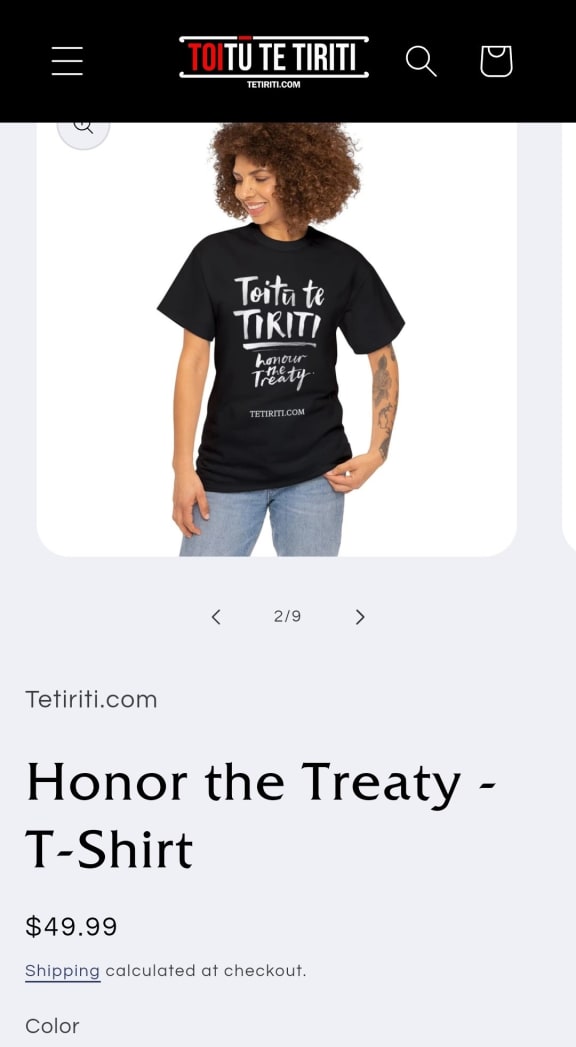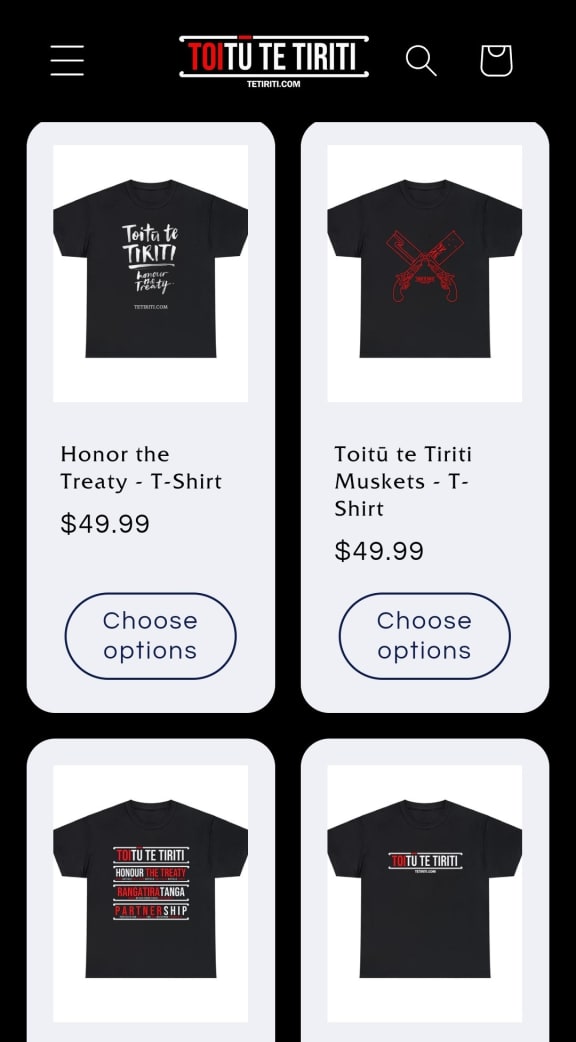
People bearing Toitū te Tiriti in action at Waitangi this year Photo: RNZ / Angus Dreaver
Scammers have targeted the merchandise of Māori designers and artists promoting the Toitū Te Tiriti movement.
The phrase - meaning Honour the Treaty - has become a popular catch cry for activists protesting the government's policies affecting Māori.
Aroha Tamihana - the owner of Maimoa Creative - released a free, downloadable Toitū te Tiriti template in the lead up to Waitangi Day.
She was later alerted by her followers that someone was using her free design to make a profit.

Aroha Tamihana Photo: Catherine Smith Photography
She was able to get the website taken down within 48 hours, but not before a few people were sucked in.

Screenshot from the scam website. Photo: Supplied / Aroha Tamihana
"Their website was very sophisticated, very polished, they even had the nerve to put in a pepeha. Which was actually one of the warning signs because their pepeha didn't really make sense when you read it," she said.
Tamihana said scams like this were getting more sophisticated and it was no longer a matter of just looking out for spelling mistakes.
"Honestly I think everyone's a target, scammers don't really care who they scam or where they get the money from, I think they just target whatever is trending, they target vulnerable people or innocent people, people that don't really know what to look out for."
Tamihana said the whole experience has been unpleasant, especially after she reached out to the sham website and they responded with highly threatening e-mails.
She initially considered withdrawing her free templates but decided against it.
"I realized that's kind of letting them win and that's not really fair on the hundreds of other people that actually are really respectful and do support my kaupapa, so it was a passing fleeting thought but in the end I was like 'nah this is going to happen regardless' I just have to be aware of it and on the lookout."
Tamihana said consumers need to look out for reviews and check the websites social media accounts, especially if you're an impulse buyer.
'It is getting quite painstaking'

Photo: Artist Hohepa Hori Thompson
Ōtaki based artist Hohepa 'The Hori' Thompson also had his designs taken by the same people. He said they were only after one thing - the money.
Artists were sick to death of putting in the hard work, only to have someone come in and profit off their brand, he said.
"I'd love to sit down face to face with every single one of them and go well just show me your designs. I want to see your designs, not my designs, and I want to challenge you on why you actually think this is okay... to take all these peoples hard work."

Screenshot from the scam website, with Aroha Tamihana's design on the right and the Hori's on the left. Photo: Supplied / Aroha Tamihana
Thompson said Toitū te Tiriti was about the kaupapa - the activism - not about turning a profit.
"It is getting quite painstaking having to constantly message them, and their arrogance in saying that 'this is about the kaupapa' they are blatantly not. They are just profiting from this and not one part of that goes toward the kaupapa whatsoever, it goes into their back pocket."
Thompson has been in business for 12 years and he said he had developed a tough skin, but he felt bad for the artists who were just getting started.
He said artists needed to stomp out scams straight away - even if it meant getting lawyers involved. Scammers will backpedal if they got that message, he said.
'A significant increase in misuse'
Lynell Tuffery Huria - a patent attorney and tumu whakahaere (managing partner) at Kahui Legal - said the number of scams like this had increased, especially since Covid when there was a proliferation of internet businesses.
She said as technology improved, Māori designs were at risk. Scammers could simply extract the designs and put them on everything from blankets to cars to shower curtains.
"There are definitely deliberate attempts to appropriate and misappropriate indigenous designs around the world, so therefore Māori and other indigenous peoples are facing a significant increase in that misuse and appropriation."
Huria pointed to the landmark WAI 262 claim - commonly known as the Fauna, Flora and Intellectual Property Rights claim - as an attempt to get the government to consider protections for Māori IP.
But she said because the claim was so complex and all-encompassing, the government had done very little to settle the issues raised in it.
"So there are some specific protections available, but there's no general protections. There's no general acknowledgment that our culture and heritage is a taonga and therefore we need to be respectful when we are using that taonga, we are using that taonga in accordance with a te ao Māori perspective."
Huria said there were a few options available to take down scam pages - social media sites usually have fast working takedown measures to tap into, the scammers can be contacted directly or legal support could be sought.
"Legal support is helpful but given the regime that we have or the legal system that we operate in and the lack of protection, it is very difficult to get them taken down through the legal means, so it's usually a vehicle of last resort."




